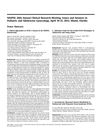 18 citations,
March 2008 in “British Journal of Dermatology”
18 citations,
March 2008 in “British Journal of Dermatology” Finasteride works better for hair loss in patients 26 or younger.
 November 2018 in “Endocrine Abstracts”
November 2018 in “Endocrine Abstracts” A woman's high testosterone levels were caused by a rare ovarian tumor, not the initially diagnosed condition.
 20 citations,
October 2018 in “Clinical Drug Investigation”
20 citations,
October 2018 in “Clinical Drug Investigation” Dutasteride does not impair mental function in elderly men with enlarged prostate.
 October 2023 in “Journal of the Endocrine Society”
October 2023 in “Journal of the Endocrine Society” Losing weight, possibly through bariatric surgery, is key to improving PCOS and hyperandrogenism symptoms in obese patients.
 77 citations,
July 2013 in “Best Practice & Research in Clinical Obstetrics & Gynaecology”
77 citations,
July 2013 in “Best Practice & Research in Clinical Obstetrics & Gynaecology” Menopause reduces skin collagen and elasticity, and while estrogen therapy can help, its risks require careful consideration.
 20 citations,
January 2003 in “Treatments in Endocrinology”
20 citations,
January 2003 in “Treatments in Endocrinology” Testosterone therapy can help improve mood, sexual function, and bone health in women with low androgen levels, but more research is needed to establish safe and effective guidelines.
 45 citations,
September 1998 in “Journal of Investigative Dermatology”
45 citations,
September 1998 in “Journal of Investigative Dermatology” The enzyme 17β-HSD type 2 mainly performs oxidation in human sebaceous glands, which may help protect against acne.
 33 citations,
December 2015 in “Neuroendocrinology”
33 citations,
December 2015 in “Neuroendocrinology” Finasteride treatment changes brain steroid levels and receptors, affecting brain function even after stopping treatment.
 9 citations,
September 2015 in “Reproductive Biomedicine Online”
9 citations,
September 2015 in “Reproductive Biomedicine Online” Longer GGN repeats in the androgen receptor gene are linked to polycystic ovary syndrome.
 March 2012 in “Journal of Pediatric and Adolescent Gynecology”
March 2012 in “Journal of Pediatric and Adolescent Gynecology” Doctors vary in how they initially test for PCOS, but most agree on using oral contraceptives and lifestyle changes as first treatments.
 March 2012 in “Journal of Pediatric and Adolescent Gynecology”
March 2012 in “Journal of Pediatric and Adolescent Gynecology” Androgen levels do not determine the type of PCOS symptoms in young females.
 14 citations,
January 2012 in “Endocrine development”
14 citations,
January 2012 in “Endocrine development” The conclusion is that a thorough approach is needed to diagnose and manage hyperandrogenism in teenage girls, recognizing its major psychological and health effects.
May 2011 in “Journal of pediatric nursing” A patient with congenital adrenal hyperplasia improved after adjusting her medication to prevent Cushing's syndrome symptoms.
 November 2014 in “John Wiley & Sons, Ltd eBooks”
November 2014 in “John Wiley & Sons, Ltd eBooks” Eating high-glycemic and dairy foods can increase hormones that may cause acne and other health issues.
 63 citations,
November 1999 in “British journal of dermatology/British journal of dermatology, Supplement”
63 citations,
November 1999 in “British journal of dermatology/British journal of dermatology, Supplement” Hair sensitivity to androgens is partly controlled by specific enzyme expressions in different hair areas.
 45 citations,
August 2010 in “Hormone Molecular Biology and Clinical Investigation”
45 citations,
August 2010 in “Hormone Molecular Biology and Clinical Investigation” Type 3 5α-reductase is more common and finasteride and dutasteride strongly inhibit it.
 October 2023 in “International Journal For Multidisciplinary Research”
October 2023 in “International Journal For Multidisciplinary Research” Women with PCOS face many health risks, but exercise, a healthy diet, and weight management can help.
 28 citations,
May 2013 in “The Journal of Steroid Biochemistry and Molecular Biology”
28 citations,
May 2013 in “The Journal of Steroid Biochemistry and Molecular Biology” Testosterone therapy can improve sexual desire and function in postmenopausal women but should be used cautiously and not based solely on testosterone levels.
 76 citations,
December 2009 in “Clinics in Dermatology”
76 citations,
December 2009 in “Clinics in Dermatology” Hormonal treatments can help with acne but are not the first choice due to side effects and the need for careful patient selection.

Neurokinin B levels are higher in the placentas of women with PCOS who have female babies.
 1 citations,
February 2014 in “Archiv Der Pharmazie”
1 citations,
February 2014 in “Archiv Der Pharmazie” Carbamates may help treat androgen-dependent conditions by changing how certain lipid enzymes are produced.
 37 citations,
January 2008 in “Gynecological Endocrinology”
37 citations,
January 2008 in “Gynecological Endocrinology” Shorter CAG repeats in a specific gene may increase male hormone activity and symptoms like acne and excess hair in women with PCOS.
 5 citations,
June 2004 in “The Journal of The British Menopause Society”
5 citations,
June 2004 in “The Journal of The British Menopause Society” Testosterone therapy can improve sexual satisfaction and mood in surgically menopausal women when used with estrogen, but its long-term safety and effects on naturally menopausal and premenopausal women are unclear.
 4 citations,
November 2015 in “Journal of Investigative Dermatology”
4 citations,
November 2015 in “Journal of Investigative Dermatology” Testosterone may worsen hair loss by affecting hair growth signals, while different prostaglandins can either hinder or promote hair growth.
21 citations,
April 1995 in “Mayo Clinic Proceedings” Leydig cells can cause testosterone-secreting adrenal tumors in women.
 62 citations,
August 2018 in “Frontiers in Endocrinology”
62 citations,
August 2018 in “Frontiers in Endocrinology” Androgens are important for normal ovarian function and estrogen production, but may not be the main cause of follicle death.
 38 citations,
January 1997 in “Gynecological Endocrinology”
38 citations,
January 1997 in “Gynecological Endocrinology” Finasteride and flutamide effectively reduce hirsutism in PCOS women, with flutamide also lowering hormone levels.
 59 citations,
August 2004 in “Human Reproduction Update”
59 citations,
August 2004 in “Human Reproduction Update” Testosterone replacement can help women with low libido and mood, but they need to have enough estrogen first to avoid side effects.
 6 citations,
September 2005 in “Expert Opinion on Pharmacotherapy”
6 citations,
September 2005 in “Expert Opinion on Pharmacotherapy” Androgen therapy can help with symptoms like low libido in women, but more research is needed to understand its long-term safety and effects on health.
 22 citations,
June 2004 in “Journal of The European Academy of Dermatology and Venereology”
22 citations,
June 2004 in “Journal of The European Academy of Dermatology and Venereology” A woman had both Graham Little-Piccardi-Lassueur syndrome, causing hair loss, and complete androgen insensitivity syndrome, making her genetically male but physically female. This suggests androgens don't affect the hair loss condition.




























